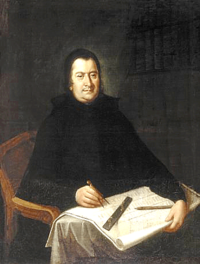Stanisław Konarski facts for kids
Quick facts for kids
Stanisław Konarski, Sch.P.
|
|
|---|---|

anonymous portrait
|
|
| Born | 30 September 1700 Żarczyce Duże, Poland
|
| Died | 3 August 1773 (aged 72) |
| Occupation | Poet, dramatist |
Stanisław Konarski (born Hieronim Konarski; September 30, 1700 – August 3, 1773) was a very important Polish priest, teacher, and writer. He helped change education in Poland and was a key figure in the Enlightenment movement there. The Enlightenment was a time when people focused on reason and new ideas. Konarski was a member of the Piarist order, which is a group of priests focused on education. He worked to improve schools and the way Poland was governed.
Contents
Early Life and Education
Stanisław Konarski was born in a place called Żarczyce Duże in Poland. He studied in Rome from 1725 to 1727 at the Collegium Nazarenum. There, he became a teacher of rhetoric, which is the art of speaking and writing well. After his studies, he traveled a lot. He visited countries like France, Germany, and Austria. These travels helped him learn even more and broaden his knowledge.
Important Work and Reforms
When Konarski returned to Poland in 1730, he started working on a new collection of Polish laws. This collection was called Volumina legum. It was a big project to organize the country's legal system.
Founding New Schools
In 1740, Konarski started a very important school in Warsaw called the Collegium Nobilium. This school was special because it was for the sons of the szlachta, who were the noble families in Poland. It was an elite school, meaning it was for the best students from important families. He wanted to give them a modern and excellent education.
In 1747, he opened the first public library in Europe that was open to everyone. This library was also in Warsaw. It showed his belief that knowledge should be available to more people.
Changing Education in Poland
Konarski also worked hard to reform the education system of the Piarist order in Poland. He wrote a special plan for education called the Ordinationes Visitationis Apostolicae... in 1755. His ideas and changes were a big step forward. They helped modernize the Polish education system during the 18th century. He believed in teaching students to think for themselves and to be good citizens.
Political Ideas and Influence
Konarski was involved in politics and worked with important leaders. He was connected to King Stanisław Leszczyński and later with King Stanisław August Poniatowski. He even attended the famous "Thursday dinners" held by King Stanisław August. These dinners were meetings where important people discussed new ideas.
King Stanisław August honored Konarski by making a special medal for him. The medal had Konarski's picture and a Latin phrase: Sapere auso. This means "Dare to know!" It showed how much the king valued Konarski's ideas about learning and thinking.
Konarski also strongly argued against something called the Liberum veto. This was a rule that allowed any single noble to stop a law from passing in the Polish parliament. Konarski believed this rule was harmful and not a real law, but just a bad custom. He thought it made it hard for Poland to make progress.
Reforming the Government
His most important book was a four-part work called O skutecznym rad sposobie albo o utrzymywaniu ordynaryinych seymów. This long title means "On an effective way of councils or on the conduct of ordinary sejms." In this book, written between 1760 and 1763, he suggested big changes for the Polish parliament, known as the general sejm. He also proposed new ways to organize the government of the Polish–Lithuanian Commonwealth. One of his ideas was to have a permanent council to help the king govern the country.
Later Life and Legacy
Stanisław Konarski passed away in Warsaw, Poland, when he was 72 years old. His heart is kept in an urn in the Piarist church in Cracow. You can see a bust (a sculpture of his head and shoulders) of him at the entrance to the crypt of this church. Konarski's work had a lasting impact on education and political thought in Poland.
See also
 In Spanish: Estanislao Konarski para niños
In Spanish: Estanislao Konarski para niños
- History of philosophy in Poland
 | Jewel Prestage |
 | Ella Baker |
 | Fannie Lou Hamer |

